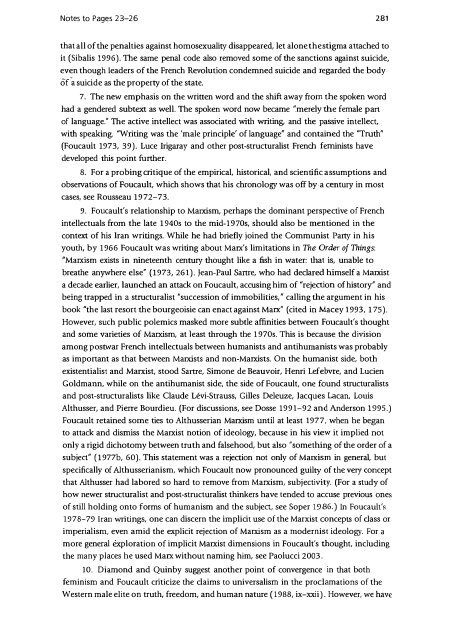foucault-and-the-iranian-revolution-janet-afary
foucault-and-the-iranian-revolution-janet-afary
foucault-and-the-iranian-revolution-janet-afary
Create successful ePaper yourself
Turn your PDF publications into a flip-book with our unique Google optimized e-Paper software.
Notes to Pages 23-2 6 281<br />
that all of <strong>the</strong> penalties against homosexuality disappeared, let alone <strong>the</strong> stigma attached to<br />
it (Sibalis 1996). The same penal code also removed some of <strong>the</strong> sanctions against suicide,<br />
even though leaders of <strong>the</strong> French Revolution condemned suicide <strong>and</strong> regarded <strong>the</strong> body<br />
o(i1 suicide as <strong>the</strong> property of <strong>the</strong> state.<br />
7. The new emphasis on <strong>the</strong> written word <strong>and</strong> <strong>the</strong> shift away from <strong>the</strong> spoken word<br />
had a gendered subtext as well. The spoken word now became merely <strong>the</strong> female part<br />
of language." The active intellect was associated with writing. <strong>and</strong> <strong>the</strong> passive intellect,<br />
with speaking. "Writing was <strong>the</strong> 'male principle' of language" <strong>and</strong> contained <strong>the</strong> "Truth"<br />
(Foucault 1973, 39). Luce Irigaray <strong>and</strong> o<strong>the</strong>r post-structuralist French feminists have<br />
developed this point fur<strong>the</strong>r.<br />
8. For a probing critique of <strong>the</strong> empirical. historical. <strong>and</strong> scientific assumptions <strong>and</strong><br />
observations of Foucault, which shows that his chronology was off by · a century in most<br />
cases, see Rousseau 1972-73.<br />
9. Foucault's relationship to Marxism, perhaps <strong>the</strong> dominant perspective of French<br />
intellectuals from <strong>the</strong> late 1940s to <strong>the</strong> mid-1970s, should also be mentioned in <strong>the</strong><br />
context of his Iran writings. While he had briefly joined <strong>the</strong> Communist Party in his<br />
youth, by 1966 Foucault was writing about Marx's limitations in The Order of Things:<br />
"Marxism exists in nineteenth century thought like a fish in water: that is, unable to<br />
brea<strong>the</strong> anywhere else" (1973, 261). Jean-Paul Sartre, who had declared himself a Marxist<br />
a decade earlier, launched an attack on Foucault, accusing him of "rejection of history" <strong>and</strong><br />
being trapped in a structuralist "succession of immobilities, " calling <strong>the</strong> argument in his<br />
book "<strong>the</strong> last resort <strong>the</strong> bourgeoisie can enact against Marx" (cited in Macey 1993, 175).<br />
However, such public polemics masked more subtle affinities between Foucault's thought<br />
<strong>and</strong> some varieties of Marxism, at least through <strong>the</strong> 1970s. This is because <strong>the</strong> division<br />
among postwar French intellectuals between humanists <strong>and</strong> antihumanists was probably<br />
as important as that between Marxists <strong>and</strong> non-Marxists. On <strong>the</strong> humanist side, both<br />
existentialist <strong>and</strong> Marxist, stood Sartre, Simone de Beauvoir, Henri Lefebvre, <strong>and</strong> Lucien<br />
Goldmann, while on <strong>the</strong> antihumanist side, <strong>the</strong> side of Foucault, one found structuralists<br />
<strong>and</strong> post-structuralists like Claude Levi-Strauss, Gilles Deleuze, Jacques Lacan, Louis<br />
Althusser, <strong>and</strong> Pierre Bourdieu. (For discussions, see Dosse 1991-92 <strong>and</strong> Anderson 1 9 9 5 . )<br />
Foucault retained some ties to Althusserian Marxism until at least 1977, when he began<br />
to attack <strong>and</strong> dismiss <strong>the</strong> Marxist notion of ideology, because in his view it implied not<br />
only a rigid dichotomy between truth <strong>and</strong> falsehood, but also " something of <strong>the</strong> order of a<br />
subject" (1977b, 60). This statement was a rejection not only of Marxism in general, but<br />
specifically of Althusserianism, which Foucault now pronounced guilty of <strong>the</strong> very concept<br />
that Althusser had labored so hard to remove from Marxism, subjectivity. (For a study of<br />
how newer structuralist <strong>and</strong> post-structuralist thinkers have tended to accuse previous ones<br />
of still holding onto forms of humanism <strong>and</strong> <strong>the</strong> subject, see Soper 1986.) In Foucault's<br />
1978-79 Iran writings, one can discern <strong>the</strong> implicit use of <strong>the</strong> Marxist concepts of dass or<br />
imperialism, even amid <strong>the</strong> explicit rejection of Marxism as a modernist ideology. For a<br />
more general exploration of implicit Marxist dimensions in Foucault's thought, including<br />
<strong>the</strong> many places he used Marx without naming him, see Paolucci 2003 .<br />
10. Diamond <strong>and</strong> Quinby suggest ano<strong>the</strong>r point of convergence in that both<br />
feminism <strong>and</strong> Foucault criticize <strong>the</strong> claims to universalism in <strong>the</strong> proclamations of <strong>the</strong><br />
Western male elite on truth, freedom, <strong>and</strong> human nature (1988, ix-xxii). However, we have


